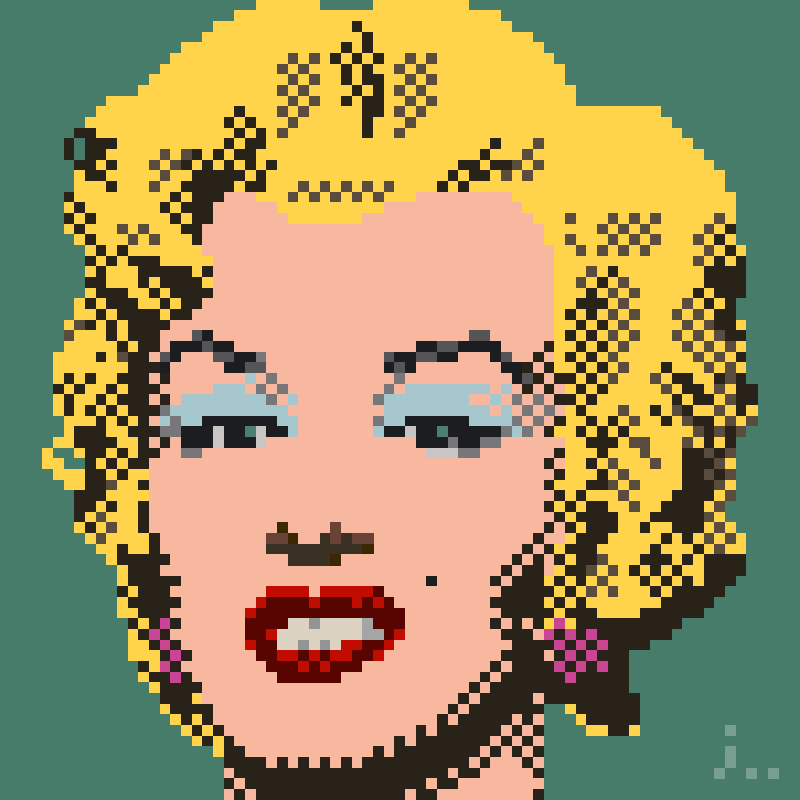Misdiagnosed
And my first hospitalization

On Chicago’s northbound “L” train, I stood in the aisle grasping a pole because all seats were taken. The passengers’ bulky parkas made the car seem even more full. I was squished between my then-husband and a woman whose music I could hear through her headphones. Jay had met me at work, and we were headed home.
The elevated train rumbled along. We passed skyscrapers downtown, and apartment buildings only two or three stories tall as we entered more residential areas. We sped past snow-covered garages and plowed alleys. As I stared out the window, a translucent overlay of Andy Warhol’s Marilyn Monroes appeared before me. I could see the other passengers through these squares, but filtered through the painting’s colors.
I turned to Jay. “Do you see this?”
“See what?”
I swept my mittened hand in front of me to indicate the overlay. “This.”
He frowned. “I don’t see anything.”
My face and body grew warmer underneath my heavy coat. My surroundings flickered as though a strobe light illuminated the train’s interior. I lowered myself, and sat in the aisle at everyone else’s booted feet because I felt faint. I ignored the stares. Jay helped me up.
Fortunately, a hospital was just a few stops away. We exited, and walked through the chill and into the emergency room where I must have passed out because the next thing I knew, I was wearing a hospital gown and a pair of too-big socks, tan with white rubber grippers on the soles. I sat in a wheelchair facing a set of double doors made of metal. A young woman peeked through the inset window, her face contorted into an ugly frown.
A blue sign next to the doors said, “Psychiatric Unit” in white letters. I tightened my grip on the wheelchair’s armrests. Instead of entering whatever was behind those doors, the orderly turned to the right, and wheeled me into a large room containing couches, chairs, tables, and a TV. A handful of patients, some in street clothes, some in hospital gowns, watched television. Others played a board game, and a couple more worked on a jigsaw puzzle.
A woman wearing slacks and a light gray sweater approached, smiling. “I’m Debra, your nurse,” she said, pointing to her name tag. She helped me out of the wheelchair.
“This is the day room,” she continued, gesturing towards the sofas. “Patients spend time here between group therapy sessions, but group is over for the day. It’s also where you’ll eat. You missed dinner, but I’ll have something sent up.”
I followed her into a room illuminated by fluorescent lighting, where a pair of twin-sized beds were made up with faded green blankets. A nightstand stood next to each one. A small doorway led to the bathroom where the nurse pointed out the unbreakable mirror.
“You don’t have a roommate right now, so take whichever bed you want,” Debra said.
I moved to the one closer to the wire-reinforced window through which I saw the dark sky. When I sat, the blanket scratched the backs of my legs. I reached towards the bedside table, and pulled a drawer open. “Where’s my stuff?” I asked.
“So you do speak,” said Debra. “Your things are at the nurses’ station. You’ll get them back before you’re discharged. If you don’t want to wear that gown, a family member or friend can bring you clothes as long as they don’t have drawstrings or shoelaces.”
“What? Why?”
She turned towards the door. “Safety hazard. I’ll let you know when your dinner’s ready.”
Safety hazard. I then realized strings could be used as a weapon against another or even one’s self. I stared at my black Chuck Taylor lows, at the eyelets, empty as my own eyes looked when I got up to stare at my dull reflection in the bathroom mirror.
Earlier that day, I’d eaten an entire Thai chicken pizza for lunch so I wasn’t hungry. Besides, I imagined the food wouldn’t be good. I pulled back the covers, and climbed into bed. I didn’t wake until morning.
I sat away from the other patients in the day room for breakfast. Afterwards, a few of them holding packs of cigarettes entered a small, windowed room tucked into a corner. They sat at a table and lit up. I was still a smoker in 1995, and the last cigarette I smoked was before I boarded the train to go home the previous day.
I wanted to join them, but didn’t have my cigarettes. I’d been trembling since I woke up. My craving overwhelmed me, and I pushed aside my fears to enter the room. I breathed in the smoky haze. The tobacco smell emboldened me, as I shut the door. “Does anyone have a cigarette I can have? Please?” I asked.

The conversation stopped. A woman with gray-blonde hair and wrinkles smiled. “Here,” she said.
I took the cigarette, and she handed me a blue Bic lighter. I inhaled the nicotine, and sighed.
“I’m Greer,” she said, and pointed to an empty seat. “Care to join us?”
I moved from my place next to the door.
“What’s your name?” she asked.
“Barb.”
“Is this your first time?”
I nodded.
Greer introduced me to the others, who uttered variations of “hello.” No one drooled, stared into space, or talked to someone who wasn’t there. They shared stories about their first hospitalizations. They showed me how to navigate my time in the unit by going to all the group sessions, even if I didn’t want to, and not staying in my room all day.
“No matter how hard it is, take a shower every day,” said a man named Nick.
The night before, Debra gave me a small, cardboard tray encased in cellophane that contained toothpaste, a toothbrush, soap, shampoo, and conditioner. “I took one this morning,” I said, “but I didn’t know until after I used it that the conditioner was actually lotion.”
They laughed. “Welcome to the club,” said Greer.
Later that morning, I met with Dr. S, a psychiatrist who wore a white ascot and a navy blue blazer. Contrary to what Dr. C said, I didn’t have major depressive disorder; I had bipolar disorder. Dr. S determined this based on my history of depression and what I now realize were manic episodes: never-ending insomnia, going home with strangers, spending money I didn’t have, and generally making poor decisions even though I knew they were bad ideas. Of course, not everyone who does these things has a mental illness. But finally, I had an answer that explained my behavior.
“What about the Marilyn Monroes?” I asked.
“You had an episode of psychosis. It can happen with depression. Has it happened again?” he asked.
“No.”
“I’m adding a mood stabilizer to your antidepressant to keep the depression and mania in balance. If you experience any more hallucinations, call my office and we’ll adjust your medication,” said Dr. S.
“I can’t believe I’m still depressed. It’s been a year, and Dr. C never cured me,” I said.
His eyes softened, and he said, “Mental illness can only be managed.”
“Does that mean I have to take medication for the rest of my life?”
“Not necessarily. You’re only twenty-five. Your entire life is ahead of you,” he said as he walked out of my room.
I winced at the cliché.
That evening, my parents visited me.
“The doctor said I have bipolar disorder,” I said. “I’ve been depressed for a year. At least.”
My dad snarled, “Filipinos don’t have depression. You need to pick yourself up and choose to be happy. Don’t be lazy.”
“You’re not a doctor,” I muttered.
They left shortly afterwards, my mom crying and shaking her head. “Sira ulo niya,” she whispered to my dad, but loud enough for me to hear.
He nodded. “Yeah. She’s crazy if she thinks she’s depressed. No one can know.”
I heard what they said, but didn’t know enough at the time to figure out if it was true—if I was really crazy.


What a beautifully-written story, Barb. Thank you for sharing your experience. ❤️
Brilliant, genuine and beautiful writing.